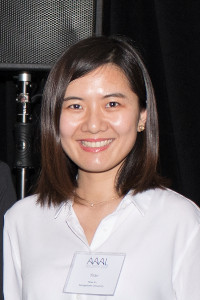
Yiran Xu joined GAMWS as an Assistant Professor of Writing Studies in 2021. She received her Ph.D. in Applied Linguistics from Georgetown University. Her research focuses on multilingual writing development and assessment, second language acquisition and bilingualism, and Systemic Functional Linguistics. Since 2015, Yiran Xu has been working with multilingual writers in different educational contexts to better understand their linguistic developmental process and to promote a dynamic, equitable approach to writing assessment. Yiran Xu’s most recent project focuses on the development and assessment of writing complexity among multilingual legal writers over one year of legal language instruction. One article that emerged from this work (currently under review with the Journal of Second Language Writing) challenges the traditional legal writing pedagogy that is largely intended for native English speakers and calls for a critical reflection on the pedagogical practices for multilingual writers. Along the same research trajectory, Yiran Xu expands the investigation of multilingual writing pedagogy and assessment to the writing classes at UC Merced, where the majority of the students are multilingual. To better understand the needs of first-year multilingual writers at UC Merced, Yiran Xu launched a research project to support multilingual writers in first-year writing classrooms (funded by the Center for the Humanities in December 2021). She is also working with Professor Paul Gibbons on implementing a translingual approach to writing (funded by the Academic Senate in March 2022) and seeks to explore students’ translingual dispositions in advanced writing classrooms.
In Spring 2022, She taught two advanced writing courses at UC Merced where she applies a translingual approach to writing and encourages her students to embrace their full linguistic repertoire. In Fall 2022, she will be teaching a new IH course on multilingualism and identity in transnational contexts where the students will explore how immigrants, internal migrants, and members of diasporic communities negotiate identities by drawing on diverse linguistic resources (e.g., home languages, “non-standard” Englishes, dialects) and by engaging in translingual or code-meshing practices in transnational contexts.



